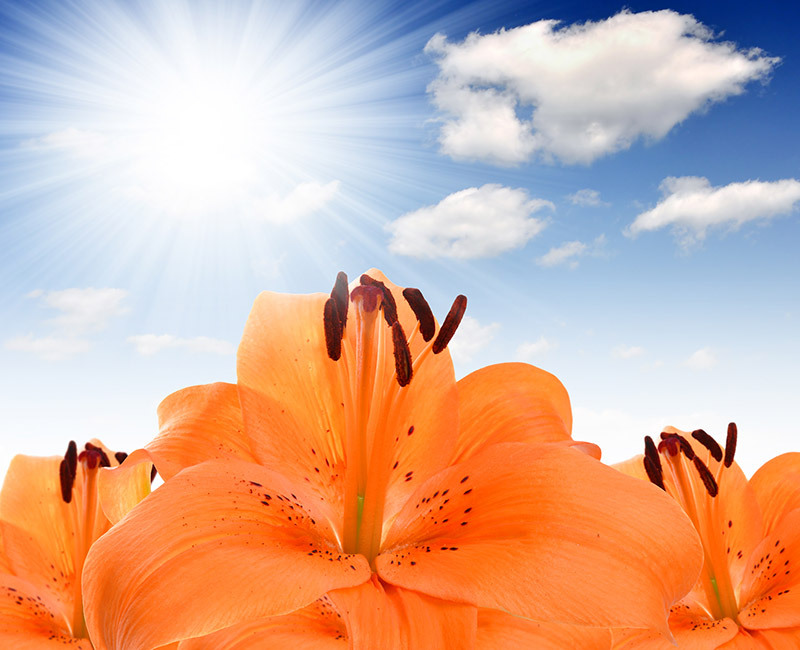Exploring the Symbolism and Color Meanings of Peony Flowers
Posted on 18/08/2025
Exploring the Symbolism and Color Meanings of Peony Flowers
Peonies have captured the hearts of flower lovers and gardeners for centuries. Their lush, full blooms, intoxicating fragrance, and rich color palettes make them an enduring favorite in gardens and floral arrangements worldwide. Peony flowers are not only prized for their beauty, but they are also steeped in cultural symbolism and meanings associated with their many colors. Join us as we delve into the enchanting world of peony symbolism, color meanings, and their significance in various traditions.

What Makes Peony Flowers So Special?
The peony (genus Paeonia) is a perennial plant native to Asia, Europe, and Western North America. These exquisite blooms have been celebrated for thousands of years in art, folklore, literature, and festivals. Peonies typically bloom in spring and early summer, displaying lush petals in shades ranging from pure white to deep burgundy.
- Long Lifespan: Some peony plants can live, flourish, and bloom for over 100 years.
- Varied Forms: Their petals can be single, semi-double, double, bomb, or anemone-shaped, adding texture and dimension.
- Captivating Scent: Many peonies exude a sweet, almost spicy aroma reminiscent of roses.
The Rich History and Origins of Peonies
Peonies trace their roots back over 2,000 years, especially prominent in Chinese culture. Revered as the "King of Flowers," peonies have adorned royal gardens, paintings, and poetry. They also anchor many legends and are regularly featured in wedding ceremonies across the globe.
- China: Symbolizes wealth, prosperity, and honor.
- Japan: Represents bravery, honor, and good fortune.
- Europe: Associated with romance, good luck, and bashfulness.
Whether in Asian scroll paintings or Victorian bouquets, the peony's symbolism transcends borders, time, and trends.
Deep Dive into Peony Symbolism
General Peony Flower Meanings
The meaning of peony flowers is multi-layered and varies depending on the culture, region, and context. Some of the most common symbolic associations include:
- Romance and Love: Peonies are often linked to romantic luck, courtship, and lasting marital bliss.
- Prosperity and Good Fortune: Their lush blooms symbolize abundance and the promise of a rich life.
- Honor and Respect: Especially regarded in China, still used in events to convey respect and admiration.
- Shyness and Bashfulness: In Victorian floriography, the peony sometimes symbolized bashfulness, perhaps due to their tendency to hide their blooms among leaves until full blossoming.
- Compassion and Healing: In holistic medicine, peony roots have been used for centuries to treat ailments, tying the flower to notions of healing and care.
The enduring legacy of peony symbolism is tracked through centuries of poetry, art, and social ritual--from Chinese dynastic traditions to modern wedding bouquets.
Understanding Peony Flower Color Meanings
Color meanings in flowers are vital in the language of blooms. Peony flowers come in an array of enchanting colors, each with unique symbolic significance. Let's discover what each peony color communicates, whether gifted, planted, or worn.
Pearl-White Peonies: Purity and New Beginnings
White peonies are the epitome of purity, innocence, and fresh starts. Their pristine petals make them a favorite in wedding bouquets, symbolizing a pure heart, the innocence of new love, and the purity of intentions.
- Ideal for bridal arrangements and christenings.
- Often sent as apologies or tokens of forgiveness.
- Commonly used to honor respectful relationships or commemorate significant new chapters.
In Chinese culture, white peonies may also be used at funerals to symbolize remembrance and respect for the departed.
Pink Peonies: Romance, Femininity & Prosperity
Pink is perhaps the most popular and widely recognized color of peonies. Pink peonies symbolize romance, graceful femininity, and a wish for good fortune.
- Features prominently in springtime festivals.
- Associated with admiration and appreciation.
- A popular gift to convey admiration or budding love.
In both Western and Eastern cultures, pink peonies are the quintessential flower of happening love stories and passionate pursuits.
Red Peonies: Honor, Respect, and Deep Passion
The bold, vivid red peony is a powerful emblem of honor, respect, and deep romantic passion. In China, red is an auspicious color symbolizing luck, celebration, and prosperity -- making red peonies a popular choice for weddings, anniversaries, and New Year festivities.
- Represent the fire of love or the strength of character.
- Often chosen for events where respect or achievement is to be celebrated.
- Given to honor elders, mentors, or as an exuberant symbol of success.
Whether in a bouquet or a garden, red peonies light the way to passion, joyous celebrations, and good fortune.
Yellow and Golden Peonies: Joy, Abundance, and Renewal
Yellow peonies -- less common in nature, but highly revered -- are associated with renewal, new beginnings, and the warmth of the sun. Their golden hues stand for joy, cheerfulness, and abundance.
- Bring light, optimism, and positivity to homes and gardens.
- Ideal for housewarming gifts or to uplift someone's spirits.
- In some cultures, golden peonies symbolize wealth and nobility.
A vase of golden peonies in the home is thought to attract prosperity and brighten up any space with its cheerful energy.
Purple and Lavender Peonies: Mystery, Elegance, and Nobility
Purple and lavender peonies evoke a sense of mystery, elegance, and royalty. Once reserved for kings and the upper class, these shades lend a regal air to gardens and bouquets.
- Used to symbolize enchantment and unique beauty.
- Popular in bouquets for lovers of the unusual or sophisticated.
- Conveys respect and admiration with a touch of refinement.
Lavender peonies are also considered tokens of spiritual strength and creative inspiration, making them excellent gifts for artists and free spirits.
Cream and Blush Peonies: Modesty, Luck, and Softness
Blush and cream shades encapsulate the meanings of modesty, gentleness, and quiet charm. They are both subtle and sophisticated, representing a gentle spirit and understated grace.
- Ideal for expressing admiration without bold declarations.
- Used in soft, romantic wedding decor and arrangements.
- Considered lucky in some Asian cultures, especially as houseplants.
These pastel peonies bring a quiet joy and soothing energy wherever they bloom.
Coral Peonies: Enthusiasm and Change
Coral peonies, with their vivid shades and almost glowing petals, exude energy, enthusiasm, and dynamic change. These rare and eye-catching blooms symbolize the promise of new adventures and a zest for life.
- Perfect for occasions marking a fresh start, such as graduations or career moves.
- Represent vibrancy and an optimistic outlook for the future.
If you want to celebrate someone's courage to embrace change or inject a space with vitality, coral peonies are the go-to choice.
Cultural Symbolism of Peony Flowers Around the World
Peonies in Chinese Culture
The cultural symbolism of peonies is perhaps deepest in China, where they are known as mudan (??). Peonies have been the country's unofficial national flower for centuries. They represent wealth, honor, and high social status, frequently appearing in imperial gardens, art, and folklore.
- Often planted at home entrances to attract good fortune and peace.
- Featured in traditional wedding decorations for a blessed union.
- Used in Chinese New Year decor as an auspicious sign.
The famed Luoyang Peony Festival still attracts visitors worldwide to witness millions of these revered blossoms every spring.
Peonies in Japanese Traditions
In Japan, peony flowers symbolize bravery, good fortune, and masculinity. They are also emblems of a happy marriage and family honor. Japanese art often depicts peonies in juxtaposition with lions, dragons, and waves to show the balance of beauty and strength.
The peony motif is prominent in kimono patterns, tattoos, and classical garden landscapes.
Peonies in the Language of Flowers (Floriography)
Victorian-era floriography, or the "language of flowers," assigned specific meanings to peonies:
- Excessive pride or vanity (sometimes pejorative)
- Shyness or bashfulness, as they sometimes drop their petals quickly in response to rough handling
- A spirit of daring and boldness
Victorians might have used peonies to send secret messages or to highlight unspoken feelings of love.
Peony Flowers in Weddings and Modern Symbolism
Today, peony blooms remain one of the most sought-after wedding flowers. Their versatility and symbolism align them beautifully with celebrations of love, unity, and prosperity.
- They are traditionally the flower of the 12th wedding anniversary.
- Used to symbolize a happy marriage and a prosperous home.
- Ideal in bouquets, corsages, and reception decor for their luxurious appearance and alluring fragrance.
Beyond weddings, peonies are a top pick for Mother's Day, graduations, birthdays, and heartfelt expressions of gratitude or encouragement.

How to Grow and Care for Peony Flowers
If you wish to bring the symbolic magic of peonies into your garden or home, a bit of preparation and patience will be rewarded with decades of breathtaking blooms. Here's how to successfully cultivate peonies:
Growing Tips for Abundant Peony Blooms
- Choose the right location: Peonies require full sun (at least 6 hours daily) and well-drained soil.
- Proper spacing: Give plants enough room to grow and ensure air flow to prevent disease.
- Planting time: Best planted in the fall, allowing roots to establish before winter.
- Minimal disturbance: Peonies don't like frequent transplantation.
- Support large blooms: Use stakes or rings to support heavy blossoms during peak bloom season.
With the right care, your peonies will continue to flourish -- embodying luck, love, honor, and joy for generations.
Conclusion: The Enduring Allure of Peony Flowers
From museum masterpieces to modern bouquets, the peony's symbolism and color meanings remain as relevant and captivating as ever. Whether you're choosing the perfect peony for a wedding, gifting a colorful bloom to a friend, or planting a symbolic peony garden, these remarkable flowers carry messages of romance, prosperity, healing, and renewal, tailored by their hues and cultural context.
Exploring the symbolism and color meanings of peonies invites us to connect with centuries of tradition while bringing a touch of grace and beauty into our own lives. Next time you admire a peony's extravagant blossom, remember the rich stories and positive energies they carry -- and perhaps, invite some of their legendary luck and love into your world.
- Peony facts: Ancient origins, versatile symbolism, and a legacy of beauty.
- Color meanings: From white purity to coral enthusiasm, each hue brings a unique message.
- Cultural impact: Symbol of fortune, honor, and celebration across continents.
- Grow your own legend: Invest in peonies for decades of vibrant blooms and meaningful connections.
Let the peony inspire your next celebration, garden, or gesture -- and watch the stories unfold petal by petal.
Latest Posts
Nurturing Cut Flowers: Essential Care Tips
Top Picks: Birthday Flowers That Brighten Any Day
Exploring the Symbolism and Color Meanings of Peony Flowers





